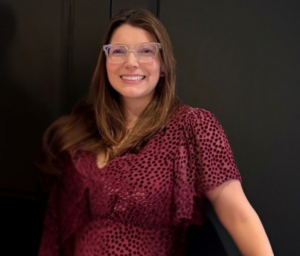Johns Hopkins UniversityEst. 1876
America’s First Research University
Lee-Lee Ellis remembers earning her doctoral degree from Johns Hopkins as bittersweet. She was proud to enter the alumni community but knew she would miss the Berman Institute of Bioethics, a place that shaped her views on ethical practices and policies relevant to human health and well-being. Eager to stay connected, she welcomed the opportunity to join its advisory board, which provides strategic guidance and support for the institute.

“I’m invested in the work of bioethics,” says Ellis, who received a PhD in Health, Policy, and Bioethics in 2015. “Joining the advisory board was a perfect way to marry my interest in bioethics and my desire to be engaged in the alumni community.”
Bioethics is a diverse field that encompasses multi-disciplinary studies: life sciences, biotechnology, public health, medicine, public policy, law, philosophy, and theology. Ellis explains how bioethics is more urgent than ever with the advancement of artificial intelligence, biotechnology, and public health.
“We need institutions like the Berman Institute that not only study ethics but are actively guiding real world policy, bringing solutions to the table,” she says. “The Berman Institute is a global thought leader. It’s meaningful to still be a part of it.”
We spoke with Ellis about her volunteer role, the importance of bioethics, and other ways she’s giving back to the Berman Institute.
It influences my work. Most recently, I was in health policy working on physician payment issues and Medicare policy. I believe ethics underpins a lot of our decision-making when it comes to policy.
When we’re trying to think of what is a fair policy, what are our priorities? Are we thinking about health equity? Are we thinking about unintended consequences? All those kinds of ethics questions are percolating in the background.
I’m able to organize my thoughts and apply ethics principles because of my training at the Berman Institute. I use it every day, not just in my work, but also as a parent and as a member of society. I’m grateful for that training.
Giving my time back to the Berman Institute and specifically focusing on alumni relations efforts was my way of investing in the next generation of students. Alumni want to stay connected to the work at the institute and to their fellow classmates. They also want to connect with alumni from the various programs and cohorts.
The alumni committee has been doing great programming. It’s valuable to receive perspectives from people in different sectors working on different bioethics issues and who are in different stages of their career. We’ve started an alumni summit, a once-a-year event where we bring together alumni. This year we’re having a former Berman Institute Hecht-Levi Fellow speak about ethics in unprecedented times of uncertainty.
Since our alumni community is geographically spread out, we have also launched a virtual research retreat, where alumni present their work and receive feedback from their peers.
The Berman Institute needs public and alumni support to continue doing their work, especially now when we’re seeing real threats to academic institutions and the potential for cuts to government funding and important projects. There’s a real space for people like me to contribute what they can to ensure that the work continues and is strengthened.
To be in a position to help educate the next generation of students who will continue to shape policy and tackle questions is so important — because we often see technology or advancements get ahead of the ethics, and we’re sometimes playing catch-up.
The Berman Institute has a long list of priorities that I fully support in terms of training, supporting clinical ethics, and the iDeas Lab. The various priorities align very well with the annual fund and the work the Berman Institute is doing.
I wasn’t anticipating how incredible it would be to join the advisory board and to serve with others who have been involved with the Berman Institute for a long time. We all feel the connection to the institute or to bioethics. I have such an opportunity to learn from those who are giving back to Hopkins and who are invested in the Berman Institute. It’s been an unexpected reward for me to be part of this incredible group of thought leaders, volunteers, and philanthropists.
Topics: Alumni, Friends of Johns Hopkins Medicine, Berman Institute of Bioethics, Promote and Protect Health